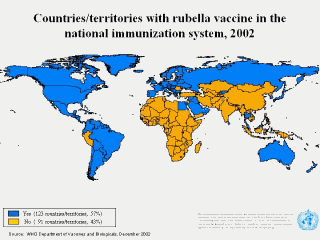| front |1 |2 |3 |4 |5 |6 |7 |8 |9 |10 |11 |12 |13 |14 |15 |16 |17 |18 |19 |review |
 Blue - yes (123 countries/territories, 57%) Yellow - no (91 countries/territories, 43%) |
The
use of measles vaccine in infant immunization programs globally has led to a significant
reduction in measles cases and deaths. In addition to providing direct protection to the
vaccine recipient, assuming high enough coverage is achieved, immunization against measles
results in the indirect protection of unimmunized persons. The shocking laxity of Peru is
perhaps interesting. Measles vaccine has several major effects on measles epidemiology
like increasing the average age of infection and increasing in the time between epidemics.
This lessening of infections can lead to universal eradication. However
determination is required.
|